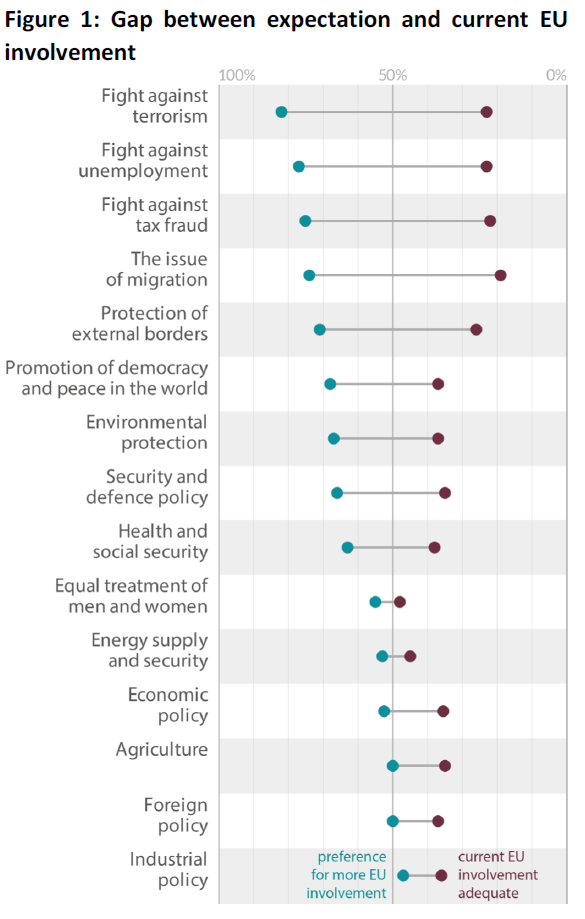Written by Clare Ferguson with Alina Dobreva and Eva-Maria Poptcheva,

Public opinion is key in any representative democracy, and none more so than the only directly elected European Union institution, the European Parliament. Commissioned for the European Parliament, and published shortly after the United Kingdom referendum vote to leave the European Union, a special Eurobarometer survey looked at the perceptions and expectations of Europeans regarding EU action, and specifically the fight against terrorism and radicalisation.
The European Parliamentary Research Service has taken the results of the survey, has analysed the gaps between citizens’ expectations and EU performance in related policy fields, and has identified possible areas for additional EU action.
The Eurobarometer survey showed that citizens have high expectations regarding EU action, and that the majority would like the EU to intervene more, particularly regarding migration and the protection of external borders. In spite of the UK decision, in many Member States, citizens remain positive as regards the Union and agree that ‘what brings them together is more important than what separates them’. Regarding the fight against terrorism and radicalisation, citizens are on high alert; and would like to see a global response, tackling both the economic aspects and the root causes of the spread of radicalisation and terrorist organisations in Europe.

So, is there a gap between citizens’ expectations of European Union action and EU policies? While the survey results vary widely across policy areas, the data show that, in most policy areas there is a clear gap between citizens’ perception of current EU involvement and their expectations and preferences for future EU action. EPRS looks at the potential – within the constraints of the current EU Treaties – for the EU to do more to meet those expectations.
In a series of blogposts over the summer months, EPRS will highlight the issues where citizens express a desire for greater intervention, and what possible actions the EU might take in:
- foreign policy, and the promotion of democracy and peace in the world;
- security and defence policy, and the fight against terrorism;
- the issue of migration, and the protection of external borders;
- health and social security, the fight against unemployment, and equal treatment of men and women;
- environmental protection, and agriculture;
- industrial policy, and energy supply and energy security;
- economic policy, and the fight against tax fraud.
Read the complete briefing on ‘Public expectations and EU policies: Identifying the gaps‘.
See other policy areas covered with this Eurobarometer.
Europeans in 2016: Perceptions and expectations, fight against terrorism and radicalisation
Special Eurobarometer of the European Parliament, conducted by TNS Opinion
Sample size: 27 969 interviews
Representativeness: EU-28, representative for EU citizens aged 15 or older
Fieldwork: 9-18 April 2016
Methodology: face-to-face interviews








[…] Source Article from https://epthinktank.eu/2016/07/22/public-opinion-and-eu-policies-exploring-the-expectations-gap/ […]
[…] of the European Parliament continue today to focus on closing any gap between their constituents’ expectations and what the EU […]